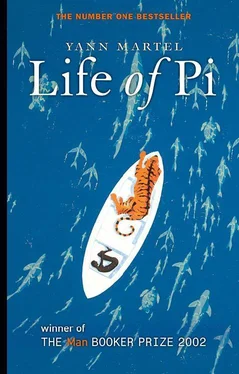Yann Martel - Life of Pi
Здесь есть возможность читать онлайн «Yann Martel - Life of Pi» весь текст электронной книги совершенно бесплатно (целиком полную версию без сокращений). В некоторых случаях можно слушать аудио, скачать через торрент в формате fb2 и присутствует краткое содержание. Год выпуска: 2002, ISBN: 2002, Издательство: Canongate Books, Жанр: Современная проза, на английском языке. Описание произведения, (предисловие) а так же отзывы посетителей доступны на портале библиотеки ЛибКат.
- Название:Life of Pi
- Автор:
- Издательство:Canongate Books
- Жанр:
- Год:2002
- ISBN:9781847674210
- Рейтинг книги:3 / 5. Голосов: 1
-
Избранное:Добавить в избранное
- Отзывы:
-
Ваша оценка:
- 60
- 1
- 2
- 3
- 4
- 5
Life of Pi: краткое содержание, описание и аннотация
Предлагаем к чтению аннотацию, описание, краткое содержание или предисловие (зависит от того, что написал сам автор книги «Life of Pi»). Если вы не нашли необходимую информацию о книге — напишите в комментариях, мы постараемся отыскать её.
Life of Pi — читать онлайн бесплатно полную книгу (весь текст) целиком
Ниже представлен текст книги, разбитый по страницам. Система сохранения места последней прочитанной страницы, позволяет с удобством читать онлайн бесплатно книгу «Life of Pi», без необходимости каждый раз заново искать на чём Вы остановились. Поставьте закладку, и сможете в любой момент перейти на страницу, на которой закончили чтение.
Интервал:
Закладка:
When an animal decides to do something, it can do it for a very long time. All morning the hyena ran in circles going yip yip yip yip yip . Once in a while it briefly stopped at the stern bench, but otherwise every lap was identical to the previous one, with no variations in movement, in speed, in the pitch or the volume of the yipping, in the counter-clockwise direction of travel. Its yipping was shrill and annoying in the extreme. It became so tedious and draining to watch that I eventually turned my head to the side, trying to keep guard with the corner of my eyes. Even the zebra, which at first snorted each time the hyena raced by its head, fell into a stupor.
Yet every time the hyena paused at the stern bench, my heart jumped. And as much as I wanted to direct my attention to the horizon, to where my salvation lay, it kept straying back to this maniacal beast.
I am not one to hold a prejudice against any animal, but it is a plain fact that the spotted hyena is not well served by its appearance. It is ugly beyond redemption. Its thick neck and high shoulders that slope to the hindquarters look as if they’ve come from a discarded prototype for the giraffe, and its shaggy, coarse coat seems to have been patched together from the leftovers of creation. The colour is a bungled mix of tan, black, yellow, grey, with the spots having none of the classy ostentation of a leopard’s rosettes; they look rather like the symptoms of a skin disease, a virulent form of mange. The head is broad and too massive, with a high forehead, like that of a bear, but suffering from a receding hairline, and with ears that look ridiculously mouse-like, large and round, when they haven’t been torn off in battle. The mouth is forever open and panting. The nostrils are too big. The tail is scraggly and unwagging. The gait is shambling. All the parts put together look doglike, but like no dog anyone would want as a pet.
But I had not forgotten Father’s words. These were not cowardly carrion-eaters. If National Geographic portrayed them as such, it was because National Geographic filmed during the day. It is when the moon rises that the hyena’s day starts, and it proves to be a devastating hunter. Hyenas attack in packs whatever animal can be run down, its flanks opened while still in full motion. They go for zebras, gnus and water buffaloes, and not only the old or the infirm in a herd—full-grown members too. They are hardy attackers, rising up from buttings and kickings immediately, never giving up for simple lack of will. And they are clever; anything that can be distracted from its mother is good. The ten-minute-old gnu is a favourite dish, but hyenas also eat young lions and young rhinoceros. They are diligent when their efforts are rewarded. In fifteen minutes flat, all that will be left of a zebra is the skull, which may yet be dragged away and gnawed down at leisure by young ones in the lair. Nothing goes to waste; even grass upon which blood has been spilt will be eaten. Hyenas’ stomachs swell visibly as they swallow huge chunks of kill. If they are lucky, they become so full they have difficulty moving. Once they’ve digested their kill, they cough up dense hairballs, which they pick clean of edibles before rolling in them. Accidental cannibalism is a common occurrence during the excitement of a feeding; in reaching for a bite of zebra, a hyena will take in the ear or nostril of a clan member, no hard feelings intended. The hyena feels no disgust at this mistake. Its delights are too many to admit to disgust at anything.
In fact, a hyena’s catholicity of taste is so indiscriminate it nearly forces admiration. A hyena will drink from water even as it is urinating in it. The animal has another original use for its urine: in hot, dry weather it will cool itself by relieving its bladder on the ground and stirring up a refreshing mud bath with its paws. Hyenas snack on the excrement of herbivores with clucks of pleasure. It’s an open question as to what hyenas won’t eat. They eat their own kind (the rest of those whose ears and noses they gobbled down as appetizers) once they’re dead, after a period of aversion that lasts about one day. They will even attack motor vehicles—the headlights, the exhaust pipe, the side mirrors. It is not their gastric juices that limit hyenas, but the power of their jaws, which is formidable.
That was the animal I had racing around in circles before me. An animal to pain the eye and chill the heart.
Things ended in typical hyena fashion. It stopped at the stern and started producing deep groans interrupted by fits of heavy panting. I pushed myself away on the oar till only the tips of my feet were holding on to the boat. The animal hacked and coughed. Abruptly it vomited. A gush landed behind the zebra. The hyena dropped into what it had just produced. It stayed there, shaking and whining and turning around on itself, exploring the furthest confines of animal anguish. It did not move from the restricted space for the rest of the day. At times the zebra made noises about the predator just behind it, but mostly it lay in hopeless and sullen silence.
CHAPTER 44
The sun climbed through the sky, reached its zenith, began to come down. I spent the entire day perched on the oar, moving only as much as was necessary to stay balanced. My whole being tended towards the spot on the horizon that would appear and save me. It was a state of tense, breathless boredom. Those first hours are associated in my memory with one sound, not one you’d guess, not the yipping of the hyena or the hissing of the sea: it was the buzzing of flies. There were flies aboard the lifeboat. They emerged and flew about in the way of flies, in great, lazy orbits except when they came close to each other, when they spiralled together with dizzying speed and a burst of buzzing. Some were brave enough to venture out to where I was. They looped around me, sounding like sputtering, single-prop airplanes, before hurrying home. Whether they were native to the boat or had come with one of the animals, the hyena most likely, I can’t say. But whatever their origin, they didn’t last long; they all disappeared within two days. The hyena, from behind the zebra, snapped at them and ate a number. Others were probably swept out to sea by the wind. Perhaps a few lucky ones came to their life’s term and died of old age.
As evening approached, my anxiety grew. Everything about the end of the day scared me. At night a ship would have difficulty seeing me. At night the hyena might become active again and maybe Orange Juice too.
Darkness came. There was no moon. Clouds hid the stars. The contours of things became hard to distinguish. Everything disappeared, the sea, the lifeboat, my own body. The sea was quiet and there was hardly any wind, so I couldn’t even ground myself in sound. I seemed to be floating in pure, abstract blackness. I kept my eyes fixed on where I thought the horizon was, while my ears were on guard for any sign of the animals. I couldn’t imagine lasting the night.
Sometime during the night the hyena began snarling and the zebra barking and squealing, and I heard a repeated knocking sound. I shook with fright and—I will hide nothing here—relieved myself in my pants. But these sounds came from the other end of the lifeboat. I couldn’t feel any shaking that indicated movement. The hellish beast was apparently staying away from me. From nearer in the blackness I began hearing loud expirations and groans and grunts and various wet mouth sounds. The idea of Orange Juice stirring was too much for my nerves to bear, so I did not consider it. I simply ignored the thought. There were also noises coming from beneath me, from the water, sudden flapping sounds and swishing sounds that were over and done with in an instant. The battle for life was taking place there too.
Читать дальшеИнтервал:
Закладка:
Похожие книги на «Life of Pi»
Представляем Вашему вниманию похожие книги на «Life of Pi» списком для выбора. Мы отобрали схожую по названию и смыслу литературу в надежде предоставить читателям больше вариантов отыскать новые, интересные, ещё непрочитанные произведения.
Обсуждение, отзывы о книге «Life of Pi» и просто собственные мнения читателей. Оставьте ваши комментарии, напишите, что Вы думаете о произведении, его смысле или главных героях. Укажите что конкретно понравилось, а что нет, и почему Вы так считаете.












